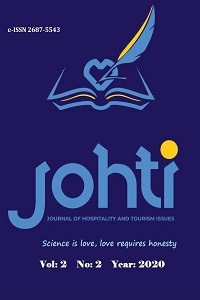Tourism As A Driver for Promoting Gender Equality and Participation of Women in the Labour Market? A Case Study of The Domestic Tourism Industry in Cox’s Bazar, Bangladesh
Abstract
Bangladesh has the highest overall ranking in Asia for gender equality (World Economic Forum 2017). The tourism industry is frequently promoted as a global driver for the economic empowerment of women (UNWTO 2010). The aim of this research is to examine if a gender gap exists in the domestic tourism industry in Cox’s Bazaar. Bangladesh has a large domestic tourism sector centred on the Cox’s Bazar district. This paper analyses labour market participation by female and male residents of Cox’s Bazar in the (i) hotel and (ii) restaurant sectors.
A mixed methodology approach is employed. Quantitative techniques are used to analyse gender differentials in labour market participation. A qualitative approach using interviews is used to identify factors contributing to the gender gap. The results of the research indicate low levels of representation by women in workforce in the hotel and restaurants sector. The research indicate that the key causes of this gender gap are social norms, the concept of gendered spaces, harassment in the workplace and lack of access to training opportunities. This research aims to contribute to knowledge relating to the gender dimension of tourism and the relationship between the tourism industry and gender equality in Bangladesh
Keywords
Tourism Cox’s Bazar Gender inequality Economic empowerment in women Ethnic minorities in the workplace Supply chain Lack of training opportunities
Project Number
N/A
References
- United Nation World Tourism Organisation. (2010), UNWTO: Annual report. A year of recovery. World Economic Forum. (2017), The Global Gender Gap Report. (https://www.weforum.org/reports/the-global-gender-gap-report-2017), (Accessed on: 10/02/2018).
Tourism As A Driver for Promoting Gender Equality and Participation of Women in the Labour Market? A Case Study of The Domestic Tourism Industry in Cox’s Bazar, Bangladesh
Abstract
Bangladesh has the highest overall ranking in Asia for gender equality (World Economic Forum 2017). The tourism industry is frequently promoted as a global driver for the economic empowerment of women (UNWTO 2010). The aim of this research is to examine if a gender gap exists in the domestic tourism industry in Cox’s Bazaar. Bangladesh has a large domestic tourism sector centred on the Cox’s Bazar district. This paper analyses labour market participation by female and male residents of Cox’s Bazar in the (i) hotel and (ii) restaurant sectors.
A mixed methodology approach is employed. Quantitative techniques are used to analyse gender differentials in labour market participation. A qualitative approach using interviews is used to identify factors contributing to the gender gap. The results of the research indicate low levels of representation by women in workforce in the hotel and restaurants sector. The research indicate that the key causes of this gender gap are social norms, the concept of gendered spaces, harassment in the workplace and lack of access to training opportunities. This research aims to contribute to knowledge relating to the gender dimension of tourism and the relationship between the tourism industry and gender equality in Bangladesh.
Keywords
Tourism Cox’s Bazar Gender inequality Economic empowerment in women Ethnic minorities in the workplace Supply chain Lack of training opportunities
Supporting Institution
N/A
Project Number
N/A
References
- United Nation World Tourism Organisation. (2010), UNWTO: Annual report. A year of recovery. World Economic Forum. (2017), The Global Gender Gap Report. (https://www.weforum.org/reports/the-global-gender-gap-report-2017), (Accessed on: 10/02/2018).
Details
| Primary Language | English |
|---|---|
| Subjects | Tourism (Other) |
| Journal Section | Research Articles |
| Authors | |
| Project Number | N/A |
| Publication Date | December 29, 2020 |
| Submission Date | August 25, 2020 |
| Acceptance Date | December 6, 2020 |
| Published in Issue | Year 2020 Volume: 2 Issue: 2 |

